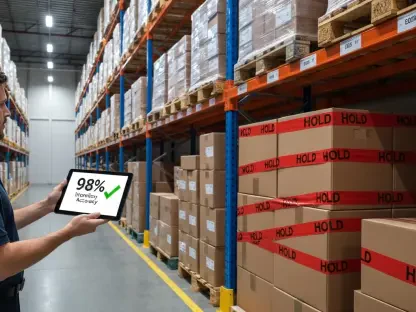The field of healthcare logistics encompasses the management and movement of medical supplies, pharmaceuticals, equipment, and human resources required for patient care. As the industry faces ongoing challenges such as counterfeit drugs, inventory mismanagement, and patient data security, blockchain technology emerges as a promising ally. Initially designed for cryptocurrency, blockchain’s decentralized, transparent, and immutable ledger system holds significant potential to streamline and transform healthcare logistics, thereby enhancing operational efficiency and improving patient care.
Blockchain technology offers a secure, decentralized framework for recording and verifying transactions. Its unique attributes have caught the attention of the healthcare sector, which is in desperate need of innovative solutions to address long-standing inefficiencies and vulnerabilities. The healthcare industry is continuously evolving, seeking ways to elevate patient care, reduce costs, and streamline operations. Blockchain stands out due to its ability to provide an immutable record that ensures the integrity of every transaction, enhancing traceability and transparency across the supply chain. These characteristics make it a formidable tool to mitigate the risk of counterfeit products and improve inventory management.
The Promise of Blockchain in Healthcare Logistics
One of the most significant advantages of blockchain in healthcare logistics is enhanced traceability. Blockchain enables real-time recording of every transaction, creating an unalterable history of products as they move through the supply chain. This ensures that each medical supply or drug can be tracked precisely from the manufacturer to the end-user. This traceability is particularly vital in combating the issue of counterfeit drugs. By maintaining a secure and transparent record of a drug’s journey, blockchain helps prevent counterfeit products from entering the supply chain. Implementations by companies such as Merck and AmerisourceBergen have demonstrated blockchain’s efficacy in ensuring drug authenticity and quality, thereby safeguarding patient health.
Blockchain technology can revolutionize inventory management by providing accurate, up-to-date records of assets, minimizing waste, and ensuring critical items are always available when needed. Managing vast inventories of medical supplies and equipment is a common challenge for healthcare facilities. Real-time tracking provided by blockchain reduces the loss and theft of medical equipment and ensures timely maintenance. Collaborations like those between GE Healthcare and Chronicled have led to the development of blockchain-based systems that optimize asset management and enhance patient safety.
Enhanced Traceability and Counterfeit Prevention
The COVID-19 pandemic highlighted the urgent need for efficient vaccine distribution systems, especially for vaccines requiring stringent temperature control during transportation and storage. Blockchain technology can address these challenges by offering end-to-end traceability of the vaccine supply chain, ensuring that vaccines are handled under the required conditions to maintain their efficacy. IBM’s Blockchain-based Vaccine Distribution Network exemplifies how blockchain can streamline cold chain logistics, preventing wastage and ensuring that vaccines reach their destination in optimal condition. Such systems are crucial in maintaining public health, particularly during global health crises.
The integration of blockchain with the Internet of Things (IoT) presents a new frontier in healthcare logistics. IoT devices are increasingly used for remote patient monitoring and managing medical equipment, generating vast amounts of data. Blockchain can provide a tamper-proof record of the data collected from IoT devices, enhancing security and reliability. Pioneers like IoTeX are at the forefront of this integration, ensuring the integrity and confidentiality of data from medical IoT devices, thereby bolstering patient trust and safety.
Improved Inventory and Equipment Management
Despite its potential, the adoption of blockchain in healthcare logistics is not without challenges. The healthcare sector is heavily regulated, and blockchain systems must comply with stringent laws such as HIPAA in the United States. Ensuring regulatory compliance while leveraging the benefits of blockchain is a delicate balancing act. Interoperability is another significant hurdle. For blockchain to be truly effective, it needs seamless integration across various healthcare systems and organizations. The initial costs associated with blockchain implementation can also be prohibitive, deterring some institutions from adopting the technology. Moreover, concerns about data privacy and ownership need careful consideration and resolution.
Several healthcare organizations and technology companies have already embarked on blockchain pilot projects and collaborations, showcasing its practical utility. These real-world implementations reflect a growing consensus on the technology’s transformative potential. The success stories of companies like Merck, GE Healthcare, and IBM underscore the tangible benefits of blockchain in enhancing traceability, improving inventory management, and ensuring the authenticity of medical products. As the technology matures, wider adoption and innovative applications are expected to follow, promising a more efficient and secure healthcare logistics landscape.
Streamlining Vaccine Distribution and Cold Chain Logistics
Blockchain stands as a beacon of innovation in healthcare logistics, offering solutions to long-standing challenges and opening new avenues for operational efficiency and patient care. The journey may be fraught with challenges, but the rewards of a transparent, secure, and efficient healthcare supply chain are well worth the effort. As blockchain technology continues to evolve and mature, its potential to revolutionize healthcare logistics becomes increasingly apparent. By addressing critical issues such as counterfeit prevention, inventory management, and data integrity, blockchain paves the way for a more trustworthy and effective healthcare system.
The ongoing efforts and collaborations in the healthcare sector highlight a future where blockchain plays a central role in logistics and supply chain management. While the path to widespread adoption may be challenging, the transformative impact of blockchain on healthcare logistics cannot be understated. Its ability to provide transparency, enhance security, and streamline operations positions blockchain as a cornerstone of modern healthcare logistics, ultimately leading to better patient outcomes and a more resilient healthcare system. As the industry continues to embrace blockchain, it is poised to overcome existing challenges and unlock new possibilities for innovation and efficiency in healthcare logistics.









